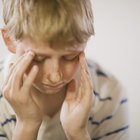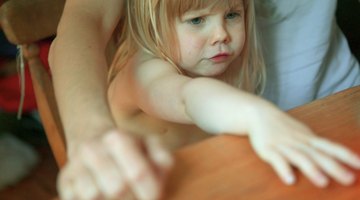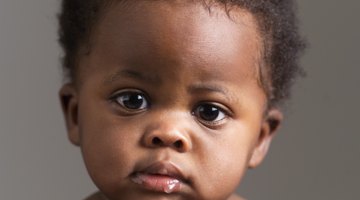Signs That Your Toddler Has Been Touched Inappropriately
When a toddler shows extreme changes in behavior and emotional state, it can signify a serious problem that she is harboring for fear or shame. According to the American Academy of Child and Adolescent Psychiatry, over 80,000 child sexual abuse cases go unreported annually. Inappropriate touching, fondling, exposure or penetration of a child is considered child molestation and sexual assault. Recognizing the visible and invisible signs of abuse can help you protect a child from further abuse and advocate for her treatment and justice.
Physical Signs
A toddler who has been physically or sexually abused might bear visible or fading signs on his body. Physical abuse appears as burns, welts, bites, bruises, broken bones, black eyes and injuries that defy explanation. Sexual abuse extends to include signs such as bleeding, abrasions, bruising and scarring in the genital areas and torn or injured genitalia, typically indicating penetration. A child who urinates frequently or expresses pain during urination might have developed a urinary tract infection, yeast infection or venereal disease as a result of sexual molestation. Other physical signs include blood in the toddler's underwear and pain or difficulty when walking or sitting.
Behavioral Signs

Drastic Changes in a Toddler's Behavior
Learn More
Children who have been touched inappropriately show changes in their behavior. They might become clingy and not want to be left alone, particularly when in the presence of the offender or a person of similar gender. Fearful toddlers might cry excessively and reach for a parent or hide behind the parent. A child can also exhibit withdrawn behavior such as pulling away from embraces, avoiding physical comfort or touch, flinching and fighting against clothing removal. An abused child could reenact the inappropriate touching on toys, pets and other children or use explicit vocabulary associated with the act. Children of abuse might also depict sexual body parts or acts in drawings. Kids experiencing abuse can suffer from frequent nightmares, sleep disruption, changes in appetite and stomach aches.
Mental/Emotional Signs
Molestation affects a toddler's mental and emotional health and growth, mirroring symptoms of the normal developmental stage know as the "terrible twos" and disorders that become obvious during toddler years such as Attention Deficit Hyperactivity Disorder, Reactive Attachment Disorder and Oppositional Defiant Disorder. A child who exhibits mental and emotional distress in combination with extreme physical, behavioral and social symptoms might be coping with inappropriate touching. Children can show signs of hyperactivity such as squirming around, running, fidgeting and blurting out. A child might appear distracted and inattentive, unable to complete tasks, stay organized and follow directions or rules. Depression can set in, resulting in a sad or listless toddler who appears apathetic toward peers, toys, activities and play time. Molestation can cause anxiety issues such as separation anxiety and fear of a specific gender, with a toddler begging or crying for the parent or caregiver to stay and expressing panic when that person leaves. The toddler can lose confidence to engage in activities and become passive or in need of constant adult affection.
Social Signs

What Are the Causes of High Pitched Screams in Children?
Learn More
Social effects of inappropriate touching on a toddler can cause the child to revert inward, refraining from social interaction and becoming isolated from peers. A child might sit or play alone, expressing decreased interest in games, toys and kids. Toddlers could become aggressive, stemming from fear, anger and frustration, leading to their mistreatment of other children by biting, hitting, kicking, intimidating, stealing toys and inappropriately touching. Other signs of aggression include temper tantrums, general defiance and breaking of toys and possessions. While certain problematic social signs of isolation and aggression are common to normal toddler behavior, conduct disorders and autism, a child who has been molested might also show physical, behavioral and emotional signs and can appear intimidated by and distrustful of adults. A toddler who has been molested can act sexually overt by trying to relate to other children and adults through inappropriate sexual touch or language similar to what she has experienced.











